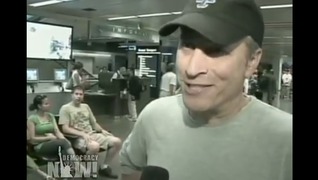
Topics
Guests
- Sami RasouliIraqi American who grew up in Najaf. He left in the late 1970s and eventually moved to the United States and settled down in Minneapolis. In November 2004, nearly thirty years after leaving Iraq, Sami returned home to help rebuild his country as director of the Muslim Peacemakers Team in Najaf. He is back in Minneapolis now on a visit from Iraq.
We speak with Sami Rasouli, an Iraqi American who grew up in Najaf. He left in the late 1970s and eventually moved to the United States and settled down in Minneapolis. In November 2004, nearly thirty years after leaving Iraq, Sami returned home to help rebuild his country as director of the Muslim Peacemakers Team in Najaf. He is back in Minneapolis now on a visit from Iraq and joins us in St. Paul. [includes rush transcript]
Transcript
AMY GOODMAN: In news from Iraq, General Petraeus has recommended delaying sharp cuts in US troop levels stationed in Iraq until next year. The recommendation came just as Senator McCain accepted the Republican nomination for president on Thursday night. McCain brought up Iraq once in his speech, and he lauded the surge.
Well, we’re joined right now by Sami Rasouli. Sami Rasouli is a native of Iraq, came to this country, got citizenship, lived in Minneapolis for many years, an Iraqi American who grew up in Najaf, came to the United States. He left in the late 1970s and eventually moved to the United States and settled down in Minneapolis. In November 2004, nearly thirty years after leaving Iraq, Sami returned home to help rebuild his country. He became director of a new organization, Muslim Peacemakers Team in Najaf. He is back in Minneapolis now on a visit from Iraq and joins me here in St. Paul. When he was living in Minneapolis, he was very well known as a restaurateur who ran a restaurant called Sinbad’s, a watering hole in Minneapolis.
Welcome.
SAMI RASOULI: Thank you, Amy. Good to see you.
AMY GOODMAN: We have interviewed you a number of times: before you made your decision to return to Iraq in the midst of the terrible violence, while you were there, when you returned. In these last few minutes of our two weeks of coverage of both conventions, your thoughts today about what is happening in Iraq?
SAMI RASOULI: Well, our concerns within the election process that’s taking place, the Republicans and the Democrats, we look at what kind of change can happen in the Middle East, mainly in Iraq and Palestine and Afghanistan. So we don’t see any difference between both parties.
As you and the audience, the viewers, and many Iraqis still remember, Mr. Biden, when he introduced the bill to the Congress last year to partition Iraq, now he came back on the ticket. So that was not a surprise for me, at least, because the surge has accomplished one of its objectives, that Iraq is ready to be partitioned, by expelling or displacing more than five million Iraqis within the country and outside of the country.
And most of those displaced people are Sunni, and they lived in the capital, the jewel of Mesopotamia, Baghdad, which is now a very depressed city, isolated by walls. Communities are segregated, and they have no way to move freely, unless they have their own badges from this community and another community. And the division is based on their background ethnically or religiously. It’s too bad for an Iraqi.
I wish yesterday Mr. McCain invited an average Iraqi family to attend and talk about the effect of the surge and the military operation for the last five years on Iraqi lives.
AMY GOODMAN: Sami Rasouli, we have to leave it there, a very somber note, but we’re going to come back to you in these weeks that you’re visiting, before you go home to Iraq. I want to thank you for being with us, as we wrap up our coverage here and return to New York.












Media Options